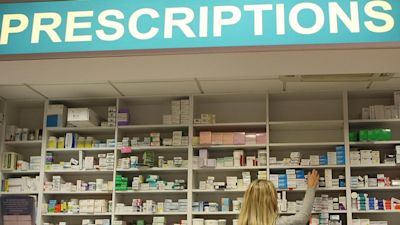Let women take all abortion pills at home, say doctors

Women should be able to take abortion pills in their own home following an online chat, such as via Skype or FaceTime, leading medics have said.
The Royal College of Obstetricians and Gynaecologists (RCOG)'s report, Better For Women, also called for the morning after pill to be made available over the counter free of charge, saying they supported calls for women, including those under-18s, to have "full access to free emergency contraception at time and place of need".
A survey of more than 3,000 women to accompany the report found many are struggling to access basic services around contraception, abortion care and the menopause.
The report aims to remove barriers to accessing care by making more use of technology such as telemedicine.
In one scenario, medics would be able to give consent to an abortion without a face-to-face appointment.
Women would then collect the tablets from their nearest pharmacy, an RCOG spokesperson said.
Women are already allowed to take the second medicine needed for an early medical abortion (before nine weeks of pregnancy), misoprostol, at home.
The RCOG report said the Department of Health and Social Care should also now consider allowing women to take the first drug, mifepristone, in their own home.
Professor Lesley Regan, president of the RCOG, said: “In 2018 the Department of Health and Social Care greatly improved women’s experience of abortion care when it allowed women to take misoprostol, the second drug used to effect an early medical abortion, at home.
“Since then women no longer have to suffer the distress or embarrassment of bleeding and cramping pain during their journey home.
“In 2019 the National Institute for Health and Care Excellence (Nice) recommended greater use of online and telephone consultations to streamline the provision of abortion care.
“To support this new best practice guidance, the Department of Health and Social Care should also consider allowing women, after their assessment, to take mifepristone in the comfort and convenience of their own home."
RCOG medics also believe the current definition of “at home” is restrictive and should be widened.
For example, women without a fixed address may not qualify for the ability to take their abortion drugs at home.
Key recommendations from the report
Access to the full range of contraception methods should be as easy as possible for all women
Post-pregnancy contraception should be a key part of the maternity pathway
Make access to progestogen-only oral contraceptives and emergency hormonal contraception (EHC) as easy as possible for all women
Women’s health one-stop clinics should be established in local community hubs and training on women’s health should be delivered to support primary and community care
All women should be able to access abortion care easily and without fear of penalties or harassment
End post-code lotteries in IVF treatment and offer all eligible women three full cycles of IVF
The study also said the UK and devolved governments “must legislate to introduce access zones around abortion care providers” to stop women being harassed.
The report said: “All women should be able to access abortion care easily and without fear of penalties or harassment.
“The RCOG must continue to work with partner organisations to advocate for the decriminalisation of abortion up to 24 weeks across the UK.”
Nearly four in 10 (37%) women said they are unable to access contraception services locally and 60% cannot access unplanned pregnancy services, including abortion care, locally.
Just over a third (34%) said they did not attend their last smear test and 58% feel there are no local support services for the menopause.
The RCOG said one-stop women’s health clinics must be set up to provide healthcare needs for women in one location and at one time.
These clinics should be available in the evenings and at weekends to improve accessibility for girls and women, it added.
In 2018, there were 200,608 abortions across England and Wales – an increase of 4% on the previous year.
The report also recommends that the morning-after pill "should be sold straight off the shelf".
At the moment, women and girls have to have a consultation with a pharmacist before they can be given an emergency contraceptive, otherwise known as the morning-after pill - taken within five days of unprotected sex.
This can leave them feeling "uncomfortable, embarrassed or judged", the report says.
It recommends that the morning-after pill should be available "in front of the counter" and off the shelf, alongside pregnancy tests and condoms.